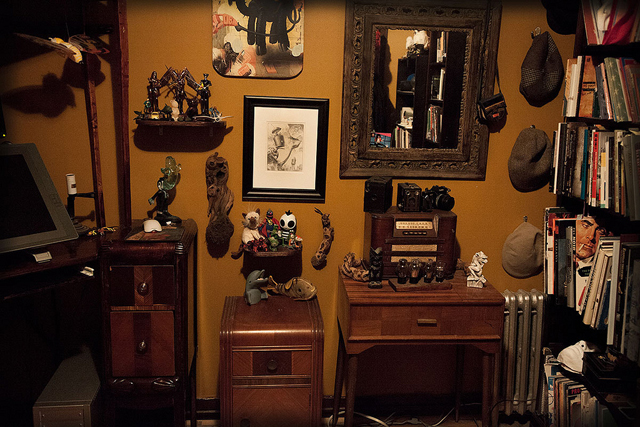What Does Your Stuff Mean?

My friend Gooby Herms’ home office in NY
While I can’t exactly blame Socrates for my tendency to seek meaning in even the most minute details of life, he provided me with a philosophical excuse to do so when he said: “The unexamined life is not worth living for a human being.†Recently, I’ve been thinking a lot about stuff and things – literally. I am fascinated by our relationship to the objects that surround us, whether it’s nurturing some kind of a collection, or choosing a reduced, even ascetic, way of living. In the process of this soul searching, I’m finding that a lot of collectors and minimalists actually have more in common than I realized.
We obviously live in a very product-driven age, what with advertising’s global reach and shopping made more accessible through the internet. So as populations rise and space and resources grow more scarce, there is an advantage to keeping things as simple possible. On top of that, moving with a lot of belongings is a chore, and we are certainly doing a lot of relocating these days. According to last year’s census report, 12% of Americans – age 1 and older – had moved at least once between 2011 and 2012. (This doesn’t deter everyone, of course. One of my relatives just moved to Bahrain for work. She brought with her just a couple of suitcases…and about 300 lbs of books.)
In response to the threats of growing consumerism, advocacy for minimized living is a popular topic among bloggers, life coaches and journalists. A few months ago, entrepreneur Graham Hill wrote an opinion piece for The New York Times about his journey from excess to simplicity. A hotly debated article, it resonated with some and was panned by others, with Richard Kim of The Nation going so far as to call it “a majestic display of guileless narcissism.â€Â The trouble with some of the advice urging us to simplify and reduce is that the process of having less can become just as needlessly competitive and aspirational as the pursuit and accumulation of more. Whether filling life with stuff or striving for minimalism, it’s important to first acknowledge our intellectual and emotional connection to objects. Getting rid of some belongings without a little bit of soul searching won’t always lead to somehow feeling lighter. Just think about the invisible accumulation that is a very new symptom of the times we live in: digital clutter rules our lives a lot more, but because it isn’t as prominent or tangible, it’s a way of expression that doesn’t get examined as frequently. Read the rest of this entry »